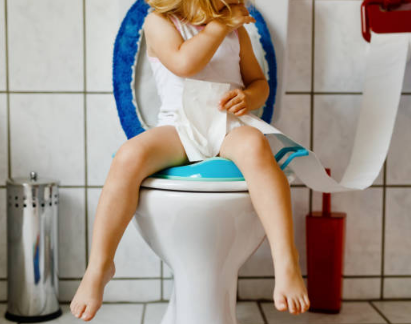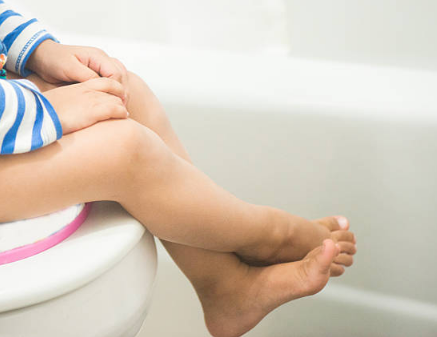The transition from diapers to potty is often not smooth. In fact, according to Elizabeth Pantley, author of the book “The No-Cry Potty Training Solution”, more than 80% of children experience setbacks during potty training.
If you potty train with stress or anxiety, your child may feel this pressure, which can be unpleasant for all involved. Before you start potty training, make sure to adopt a relaxed and positive attitude to help set the tone. But even if you’re as calm as a cucumber and as patient as a sage, potty training can still be a bumpy experience.
Read on to learn about the most common potty training problems and what to do if potty training doesn’t work.
Your Child Refuses to Go to the Toilet
Resistance can mean that now is not the right time to start potty training. “If your child doesn’t want to use the potty, chances are they aren’t ready,” says Ari Brown, MD, co-author of “Toddler 411: Clear Answers and Smart Advice for Your Toddler.”
Common signs of preparing for the toilet include:
- Showing interest in the potty
- Show awareness of when they need to go, such as hiding during bowel movements
- Let you know what is going on with a dirty diaper
- Keep it dry for at least two hours during the day

Your Child Has Had a Lot of Accidents
Accidents happen during potty training – in fact, they’re part of the whole process! When an accident happens, treat it with a calm mind and try not to get upset. Punishing and scolding will only make the child feel bad and may prolong potty training. If weeks have passed and your child still often fails to go to the toilet or has no interest in trying, they may not be ready for potty training at all. On the other hand, if accidents are few and far apart, then everything is likely to be fine with your child.
Your Child Is Not Always Aware of the Need to Pee
Does your child know when to have a bowel movement but can’t always recognize the urge to urinate? Urine leakage is normal for children who are learning to use the potty Xi. Some children still don’t have complete control of their bladder for months after they learn to control bowel movements.
If your child is only leaking a little bit of urine, but most of it goes into the potty, then you can continue your child’s potty training with this in mind. If, on the other hand, the leak is more of a complete accident and it happens with a high frequency, then you may want to consider reusing the diaper and trying the potty again after a few months.
Your Child Will Be Upset When They See Their Feces Washed Away
Some children believe that their excrement is part of their body, so the act of flushing them away can be frightening and incomprehensible. Try to explain the purpose of body waste and the need for the body to eliminate it. “Acknowledge fear, no matter how shocking it may seem,” advises Dr. Alison Chase, a psychologist who specializes in children and families.
After you understand their feelings and explain what exactly happened, you can take steps to help them get through it. Try letting your child control the flush or flush together.
Your Child Is Afraid of Flushing
Many children worry that if they sit on the toilet and flush it, they will be sucked into the toilet. To give your child a sense of control, let them flush the toilet paper. This alleviates the fear of the sound of running water and seeing things disappear.
If the fear or discomfort is too intense, you can also try using a separate potty chair or a potty seat located on top of a regular toilet. (If you’re using a public toilet with an auto-flush feature, try covering the sensor with a piece of toilet paper or post-it notes to avoid sudden accidental flushing.)
An Accident Occurs After Your Child Is Taken off the Toilet
While frustrating, in the early stages of the potty training process, urinating or pooping can happen several times immediately after sitting on the potty. It may take some time for your child to learn Xi how to relax the muscles that control the bowel and bladder while using the potty. However, if this happens frequently or lasts longer than the first few days, it could mean that your child is not ready for training.

Your Child Will Not Poop on the Potty
Learning to poop on the potty Xi is often more challenging than learning to pee Xi. Asking for a urine bula poop or hiding to poop is a sign that your child has the physical awareness and control to be potty trained, but may not be emotionally ready.
Don’t think of it as a failure, but praise your child for recognizing the signs that they have to have a bowel movement. If the first use of the potty goes well, you may need to take a step back and advise them to poop in the bathroom in a diaper to try to relax on the potty. You can then gradually make an effort to get the feces out onto the potty.
Your Child Urinates While Sleeping
Like most children, it may take longer for your child to complete nap and nighttime potty training, but getting wet while sleeping doesn’t mean daytime potty training won’t work. If they have made progress using the potty while awake but still pee while sleeping, consider using a pull-on diaper during naps and bedtime.
Encourage your child to use the potty before going to bed and immediately after waking up. If you use pull-ups while sleeping, put them in before your child goes to bed and take them off as soon as they wake up. Tell them that if they wake up in the middle of the night and need to go to the bathroom, they can go on their own or they can call you for help.
How to make potty training at night easier
Your Child Will Only Go to the Toilet with One Specific Person
In the early stages of potty training, it is common for children to become heavily dependent on one person. If your child only goes to the toilet with you, try to introduce other caregivers while gradually withdrawing from the process. The ultimate goal is independence, so you can start giving them the opportunity to complete parts of the process on their own. For example, you might offer to help your child undress or take your child to the bathroom, but wait outside the door when they sit down.
Kristen Hannibal, M.D., clinical director of general academic pediatrics at Children’s Hospital of Pittsburgh, says you can even introduce a reward system that allows them to get stickers or prizes every time they go to the toilet independently.
Your Child Is Going Backwards to the Days of Diapers
Anything that causes stress in children may encourage them to return to previous levels of development, especially if the change is recent. Stressors may include illness of a child or relative, an increase in newborns, a change in caregivers, moving from a crib to a bed, or moving to a new home.
Toilet training regression can also be caused by health problems (such as constipation) or fear of going to the toilet. It’s also possible that your child isn’t really potty trained in the first place. If you believe that your child is ready or that they have had a lot of success with the toilet, this regression should go away over time, but if you are concerned, consult your child’s doctor.
How Long Should You Potty Train Before Giving Up?
If you’ve tried everything, including the tips and tricks presented here, and your child is still struggling to complete potty training, it’s absolutely fine to take a break. Try to give potty training a break for a month or so before starting again. Trying again is not a failure. Potty training isn’t something that can be done overnight!
Keep in mind that there is no strict schedule for your child’s potty training. Even if your child is 3 years old, they may still not be ready for potty training. All children develop at different rates, but you can always talk to a healthcare provider if you have concerns or questions.

